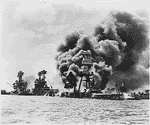|
Digital History>Teachers>Modules> Topic
Learn About World
War II

World War II killed more people, involved
more nations, and cost more money than any other war in history. Altogether,
70 million people served in the armed forces during the war and 17 million
combatants died. Civilian deaths were ever greater. At least 19 million
Soviet civilians, 10 million Chinese, and 6 million European Jews lost
their lives during the war.
World War II was truly a global war.
Some 70 nations took part in the conflict, and fighting took place on
the continents of Africa, Asia, and Europe, as well as on the high seas.
Entire societies participated, as soldiers, war workers, or victims
of occupation and mass murder.

World War II cost the United States
a million casualities and nearly 400,000 deaths. In both domestic
and foreign affairs, its consequences were far-reaching. It ended
the Depression, brought millions of married women into the workforce,
initiated sweeping changes in the lives of the nation's minority groups,
and dramatically expanded government's presence in American life.
Click to open a succinct overview of the history of World War II.

Pearl Harbor Attack Documents (1941)
http://www.fordham.edu/halsall/mod/1941PEARL.html
 Primary
sources can help you understand the origins of World War II, the reasons
for the success of the Pearl Harbor attack, and the nature of the alliance
between Britain, the Soviet Union, and the United States. You can also
learn about the impact of the war on American society, the nature of
the air war waged against Germany and Japan, and the decision to use
nuclear weapons against Hiroshima and Nagisaki. Primary
sources can help you understand the origins of World War II, the reasons
for the success of the Pearl Harbor attack, and the nature of the alliance
between Britain, the Soviet Union, and the United States. You can also
learn about the impact of the war on American society, the nature of
the air war waged against Germany and Japan, and the decision to use
nuclear weapons against Hiroshima and Nagisaki.
To learn more

Handouts and fact sheets:
World
War II Handouts and Fact Sheets
The Atomic Bomb
Recommended
lesson plan:
The
Manhattan Project
http://ohioteach.history.ohio-state.edu/Lessons/manhattan.htm
Quizzes:
Test
your knowledge about World War II by taking our World War II Quiz.

 Recommended books:
Recommended books:
David
Kennedy, Freedom from Fear: The American People in Depression
and War, 1929-1945
The literature on World War II is vast. Click
here for a useful guide to the major books on the conflict - its
causes, history, and consequences.
 Recommended
film: Recommended
film:
 Casablanca Casablanca
Much more than a story of star-crossed lovers, Casablanca metaphorically
traces the awakening of an isolationist America to the need to fight
Nazi Germany.
View the movie trailer (requires Windows media player):
http://us.imdb.com/Trailers?0034583&272&28
Ninety million Americans went to the
movies every week during World War II. The war dramatically changed
the nature of the movies, which were no longer mere entertainment, but
a valuable morale-booster, a source of information, and an instrument
of public education.
Click to learn more about:
Wartime Hollywood
Hollywood's
World War II Combat Films
Hollywood's
Treatment of War
learn
more film
 Recommended
Website: Recommended
Website:
People
at War
This exhibit highlights the contributions of the thousands of Americans,
both military and civilian, who served their country during World War
II.
http://www.archives.gov/exhibit_hall/a_people_at_war/
a_people_at_war.html
Hear what leading historians of World War II have to say about the major
controversies raised by the war.
Interviews with David M. Kennedy
http://www.pbs.org/fmc/interviews/kennedy.htm
http://www.booknotes.org/transcripts/50520.htm
Interview with William O'Neill
http://www.pbs.org/fmc/interviews/oneill.htm
|
